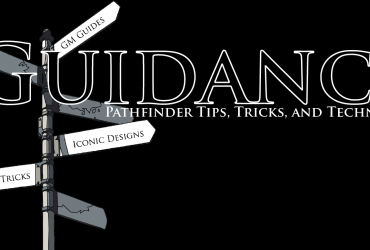Welcome to Guidance, Private Sanctuary’s source for tips and techniques for the Pathfinder Roleplaying Game, written by Everyman Gamer Alexander Augunas. Today, we’re going to be talking about murder hobos.
As many of you are aware, I’ve recently started becoming more active in Pathfinder Society. (Level 2 swashbuckler! Hooray!) Overall, Pathfinder Society is a lot of fun. I like being able to get together with people whom I wouldn’t have otherwise met to sit down and clear a small, modular adventure. It’s a blast.
But if I have ONE critique of Pathfinder Society. Just one, small critique … its that I constantly feel like a murder hobo.
What is a Murder Hobo?
Murder hobo is one of those fun little RPGamer terms that people love to throw around. In a nutshell, being a “murder hobo” refers to the idea that in many games, the players are nameless heroes who sort of just wander around killing everything they see. This is a VERY old trope and goes back all the way to classic RPGs like Final Fantasy and the original Legend of Zelda. (Although you can argue that Link HAS a home in that game, he doesn’t live there and it serves no purpose other than to be the game’s starting point.)
Its Not Easy Being Homeless. Or a Mass Murderer.
This brings us to our first question: is being a murder hobo a bad thing? The simple answer is: it depends on the sort of game you’re playing. For some games, like Legend of Zelda, being a murder hobo isn’t all that bad. The enjoyment from the game comes from dungeon delving and part of the Legend of Zelda mythos is that Link is this sort of nameless hero who rises to the occasion to fight evil. As a matter of fact, this is a major point that people who cry foul on “Murder Hobos” often ignore: the archetypical “hero’s journey” story requires the hero to be homeless in the sense that the character can’t return home until after the story is completed. That final return is usually the conclusion of the story, after all. But on the other hand, IS a character like Link homeless? Let’s examine the classic Legend of Zelda: Ocarina of Time to decide.
At the beginning of the game, Link is a young boy with a very real home. He lives in the Great Forest; he’s got a house and everything. But immediately after completing his first quest, Link is told to leave the Great Forest in search of several artifacts of great power. From that point until the very end of the game, Link doesn’t return home in the sense that he stays home and goes back to the life he once knew. He’s out and about being the hero that Hyrule needs. But is he a “Murder Hobo?” Well, no, because even though he doesn’t GO home, he HAS a home. The Great Forest, and Hyrule in general. Throughout the game, Link fights to protect his home, first the Great Forest and then Hyrule at large. His quest to protect his home’s past, present, and future is what drives the narrative foreword. Link has a home even though he doesn’t ever stay there very long.
Home is Where Your Heart Is
It’s with a little apprehension that I use a clichéd quote as my section header, but in this case the quote is absolutely right. Home doesn’t necessarily mean “the place you live” when it comes to figuring out whether or not you’re a murder hobo. In a weird way, “home” is simply valuing a place and its people. It is very difficult to know when a place is your character’s “home,” and its not something that you as a GM can really force upon your characters. Your players need to be the ones to say, “My character values this place and would sacrifice everything to protect it,” for it to be her home.
Now, naturally, every person has his or her own definition of what it means to be a murder hobo. I’ve encountered people that would adamantly state that a person is a murder hobo if they live primarily out in the wilderness or in dungeons, staying in an inn occasionally when they come to town for a few days before leaving. And despite not agreeing with those sentiments, I can understand where they’re coming from. But personally, I don’t agree with it because of games like Dragon Warrior, where you’re not going around randomly killing people; you’re going around killing villains who are trying to lay waste to your home (or in some games, have already destroyed everything you hold dear). In short, having a base of operations doesn’t mean that you have a home, and being a dungeon delver doesn’t mean that you’re homeless.
Next Monday’s article is going to expand upon this idea of homelessness in roleplaying games. I’m going to talk about how GMs can help foster a sense of patriotism in their roleplaying game to help combat murder hoboism. Until then, take care!
Alexander “Alex” Augunas has been playing roleplaying games since 2007, which isn’t nearly as long as 90% of his colleagues. Alexander is an active freelancer for the Pathfinder Roleplaying Game and is best known as the author of the Pact Magic Unbound series by Radiance House. Alex is the owner of Everyman Gaming, LLC and is often stylized as the Everyman Gamer in honor of Guidance’s original home. Alex’s favorite color is blue, his favorite Pathfinder Race/Class combination is kitsune murder hobo, and [INSERT DISTASTEFUL CRAZY HOBO JOKE HERE].







Funnily enough, I’ve never played a Murder Hobo before. Every character I’ve ever played has had a home. A pirate hunting ship, a trading post, a kingdom, a village in the desert, a traveling caravan… each one has a home that they seek to defend and/or return to.
Although, some people might want to play murder hobos for the same reason their character is a mysterious stranger with no past and that each and every person ever connected to them in anyway has perished up to this point. You know, to stop GMs from using backstory against them 😛
A murder hobo can turn away if the threat is too large, but a hero with a home will feel compelled to defend it.
calling adventurers “murder hobos” a funny way to put it but baseless upon analysis, because it places their lifestyle outside the fantasy context. DnD adventurers do not live in the modern world where they have the option of work or welfare. Their choice of lifestyle is defined by storytelling traditions rooted in ancient folklore, which portrays the world as a violent and chaotic place, reflecting both contemporary reality and psychological events common to mankind. The battle between chaos and order and the struggle for life’s goals are most often codified in physical violence which is not solely the purview of the heroes, but an essential characteristic of the fantasy universe and its inhabitants.